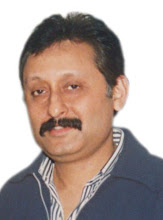('Don's Century' is a book on the cricket career and life of Don Bradman, paying tribute to him in 2008, the year of his birth centenary. It is also a panorama of batting from the 1860s onwards featuring 35 of the greatest batsmen and discussing whether Don Bradman was indeed the greatest of them all).
For long his colleague Matthew Hayden sizzled in the first-class game, but fizzled at the highest level. His successes for
The
big bully advanced menacingly down the pitch, almost intimidating the bowlers
like a giant caveman brandishing a chunky club. He did actually club the ball
with his booming drives, rasping cuts and thundering pulls. The most menacing
hitter since Ian Botham, Hayden slammed pacemen and spinners alike. His one
weakness was his tendency to play a shot too many in his quest to dominate the
bowling, thereby often giving his wicket away.
In
their heyday this century, the Australians came to be hailed for their quick
scoring. This was mainly courtesy the rousing starts Hayden gave with his
partners. In the Tests they would hammer the new ball around and Australia Australia
Hayden’s
moment of euphoria, of course, was when he broke Lara’s Test record, blasting
380 against Zimbabwe at Perth Perth India
Just
over six months later on April 12, 2004 Lara snatched the record back. Hayden bludgeoned
his way through to 8625 runs at an average of 50.73 with 30 hundreds in his 103
Tests. In the One-dayers Hayden slammed 6133 runs at an average of 43.80, and a
strike-rate of 78.96. An essential part of Ponting’s all-conquering World Cup
team, Hayden hit the then fastest century in the competition off 66 balls
against South Africa at St. Kitts in 2007. He also had the highest aggregate in
that tournament with 659 runs at an average of 73.22 with three hundreds in 11
matches. One of the hardest hitting opening batsmen in history, Hayden’s
contribution to Australian cricket has been matched by few.
These
have been some of the very best batsmen down history. Others like Mahela
Jayawardene, Kumar Sangakkara and Virender Sehwag will surely find their way in
history. It is remarkable how the name Bradman keeps cropping up while
discussing most of them. This is indicative of the standards Bradman set, and
against which most batsmen are rated. Some of the top-class batsmen of the
modern era like, to name a few, Javed Miandad and Inzamam-ul-Haq, who rendered
yeomen service to Pakistan in contrasting styles, but did not quite stir the
senses consistently; and Rahul Dravid, Jacques Kallis and Mohammad Yousuf,
technically sound and prolific scorers, but rarely dominant; have not been
discussed at length in these pages. In terms of figures they have been close to
the top, but inspirational they have seldom been. Indeed Kallis has an allround
Test record that has now surpassed the multi-faceted Sobers, and at similar
averages! But it would be hard to place Kallis in the same league as Sobers.
The very great players have an aura quite distinct.
Statistically,
nobody has been able to remotely challenge Bradman and, in a paradox to the
Sobers-Kallis reasoning, it is difficult to anoint another batsman as being
greater than The Don. Bradman was indeed unique, matchless - to put it in
corporate parlance - in terms of output, quality, productivity and
profitability, a winner and a leader by a long, long way.
(Statistics in Don’s Century are updated
till 27th August 2011, the 103rd birth anniversary of Sir Donald
Bradman).
Author
Indra Vikram Singh can be contacted on email singh_iv@hotmail.com.
Follow Indra Vikram Singh on Twitter @IVRajpipla.
Follow Indra Vikram Singh on Twitter @IVRajpipla.
Indra
Vikram Singh’s latest books
published
by Sporting Links:
A
Maharaja’s Turf ISBN 978-81-901668-3-6
The
Big Book of World Cup Cricket ISBN 978-81-901668-4-3
Don’s
Century ISBN 978-81-901668-5-0
Crowning Glory
ISBN 978-81-901668-6-7
Available
online on several websites.
Distributed
in India by :
Variety
Book Depot
AVG
Bhawan,
M-3,
Middle Circle, Connaught Circus,
New
Delhi-110 001, India.
Tel. + 91 11 23417175, 23412567.
Tel. + 91 11 23417175, 23412567.



No comments:
Post a Comment